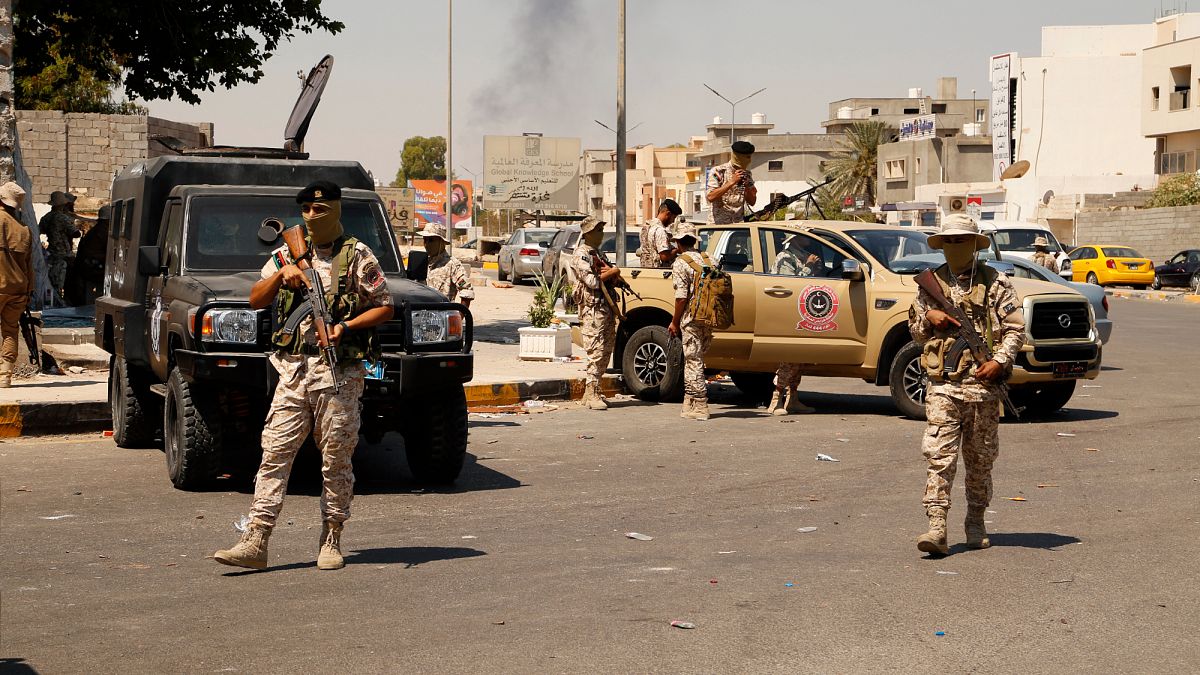Military leader Khalifa Haftar — who holds de facto power in large parts of eastern Libya — orchestrated a meeting on Tuesday as a means of “trapping” an EU delegation into recognising the legitimacy of the Benghazi-led Libyan administration, a source familiar with the issue told Euronews.
The delegation was declared “personae non gratae” and asked to depart Libyan territory upon arrival at the airport of Benghazi.
The mission travelled to eastern Libya after meeting in Tripoli with representatives of the Government of National Unity (GNU) — the internationally recognised executive led by Abdul Hamid Mohammed Dbeibah, which controls Tripoli and western Libya.
The parties had reportedly discussed joint patrols and repatriation strategies to counter illegal migration.
The delegation then journeyed to Benghazi to meet with the Government of National Stability (GNS), which controls the city of Benghazi and eastern Libya. In reality, however, real power lies with the military rule of Khalifa Haftar.
The group — which included European Commissioner for Home Affairs and Migration Magnus Brunner — intended to meet with Benghazi authorities to discuss strategies to stop the departure of migrants to European shores.
Their journey, however, was limited to Benghazi airport, where Prime Minister Osama Saad Hammad and two GNS ministers were waiting for the EU mission, with photographers and cameras in tow.
The seemingly routine reception carried the risk of portraying EU officials alongside representatives of an officially unrecognised government — effectively, at least in the media, a de facto recognition of the GNS.
The EU delegation’s objections led first to negotiations, but ultimately to the expulsion of the officials, who were declared personae non gratae. The Libyan government then issued a communiqué accusing them of carrying out an “unauthorised” mission and of “disrespecting Libyan national sovereignty.”
The Italian government described the situation as a misunderstanding of protocol. In an interview with Italian broadcaster RAI, Interior Minister Piantedosi attributed the cancellation of the meeting “at the last minute” to “resentment on the Libyan side over the overzealousness of some European delegation officials.”
He downplayed the incident, calling it a “serious episode” but insisting it did not undermine cooperation with Benghazi authorities.
Brunner and EU ministers proposed a condition for the meeting
A source familiar with the incident told Euronews however that it had been clearly agreed by the delegation that “only Haftar’s people — meaning the military — would be present” at the meeting.
The idea of other political personnel attending “had been discussed only hypothetically and was to be addressed later, if necessary”, according to the source.
As previously reported by Italian and international media, Italy’s Special Envoy to Libya Nicola Orlando was instructed to disembark first and politely asked that no photos be taken, due to the potential diplomatic implications.
Once clearance was given, the EU delegation disembarked and was escorted to a waiting room — though apparently, unpublished photos and video footage were already being taken.
When pressed for an explanation, the Libyan organiser of the visit reportedly replied by phone: “This is the Benghazi government, you have to accept it.”
According to the Brussels source, the Libyan side made clear that “in the meeting with Haftar, the government and the prime minister will also be present.”
Commissioner Brunner and the EU ministers attempted to resolve the situation, according to the source, by proposing a meeting with GNS representatives, on the condition that the talks be officially framed as involving only Haftar and his military associates.
Despite repeated efforts by the European side, the Libyans refused, insisting: “We are the government.” The source concluded: “It was obviously a trap.”
Who is General Haftar and what are his plans for Libya?
After the Libyan civil war and the death of Muammar Gaddafi in 2011, Haftar gradually expanded his influence through his Libyan National Army (LNA), eventually controlling much of Cyrenaica and Fezzan.
After more than a decade of military clashes for control of Libya, the Benghazi-based government and the 81-year-old LNA leader have gained the upper hand over the Tripoli administration. The Tripoli government enjoys international backing, but it remains weakened by internal conflicts among allied militias.
“In recent weeks, there have been significant developments, and the eastern government has become emboldened. Now they have Russian weapons, so they are very powerful — and have a lot of money,” said another source familiar with the issue.
“This government is trying to assert itself and is using all forms of pressure,” the source added, citing migrant departures to Europe as an example. Their aim is to “to push Tripoli aside and be the only government.”
Read the full article here


